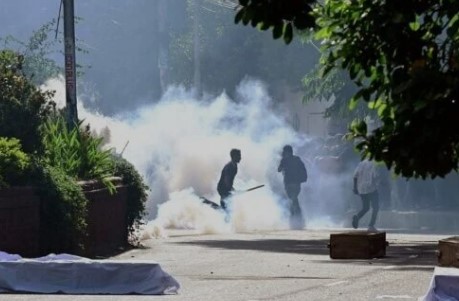In a dramatic escalation of unrest in Bangladesh, at least 32 people have died following violent clashes between protesters and police. The turmoil erupted when demonstrators, angered by perceived injustices in civil service hiring rules, set fire to the headquarters of the State broadcaster BTV in Dhaka on Thursday.
The violence unfolded after Prime Minister Sheikh Hasina’s televised appeal for calm, which aimed to address the growing discontent. Despite her efforts, the unrest intensified as protesters clashed with riot police armed with rubber bullets. The demonstrators overwhelmed the police, pursuing them to BTV’s headquarters where they ignited a fire that engulfed the building’s reception area and damaged numerous vehicles.
Although the broadcaster reported that “many people” were initially trapped inside, it later confirmed that everyone had been safely evacuated. The fire, which disrupted BTV’s operations, is still burning, with broadcast services temporarily suspended.
In response to the escalating violence, Hasina’s government has closed schools and universities indefinitely, while law enforcement intensifies its crackdown. The PM condemned the “murder” of protesters and vowed accountability, but the violence on the streets continued despite her appeal for restraint. Police have used rubber bullets and tear gas in attempts to disperse crowds.
The death toll includes at least 25 fatalities from Thursday alone, in addition to seven from earlier in the week. Hospitals report that a significant number of casualties resulted from police weaponry, with many suffering from rubber bullet and gunshot wounds.
In Dhaka, violence claimed the life of Mehedi Hasan, a reporter from Dhaka Times, who was covering the clashes. Several cities across Bangladesh experienced similar outbreaks of violence, with riot police confronting protesters who blocked roads and highways.
The protests have been driven by demands to end a civil service quota system that critics argue favours pro-government groups. This quota system is seen as a symbol of the broader dissatisfaction with Hasina’s administration, which has been accused of authoritarian practices and suppressing dissent.
Protesters have called Hasina a dictator, expressing frustration with her long tenure and recent electoral victories, which critics claim lacked genuine opposition. The unrest has been further complicated by widespread mobile internet outages and restrictions on social media platforms, which have been used by protesters to organise and mobilise.
Amnesty International has criticised the use of excessive force by Bangladeshi security forces, highlighting the severity of the crackdown on dissent. As the situation continues to unfold, the international community watches closely, concerned about the impact of the ongoing violence on the nation’s stability and human rights.

















